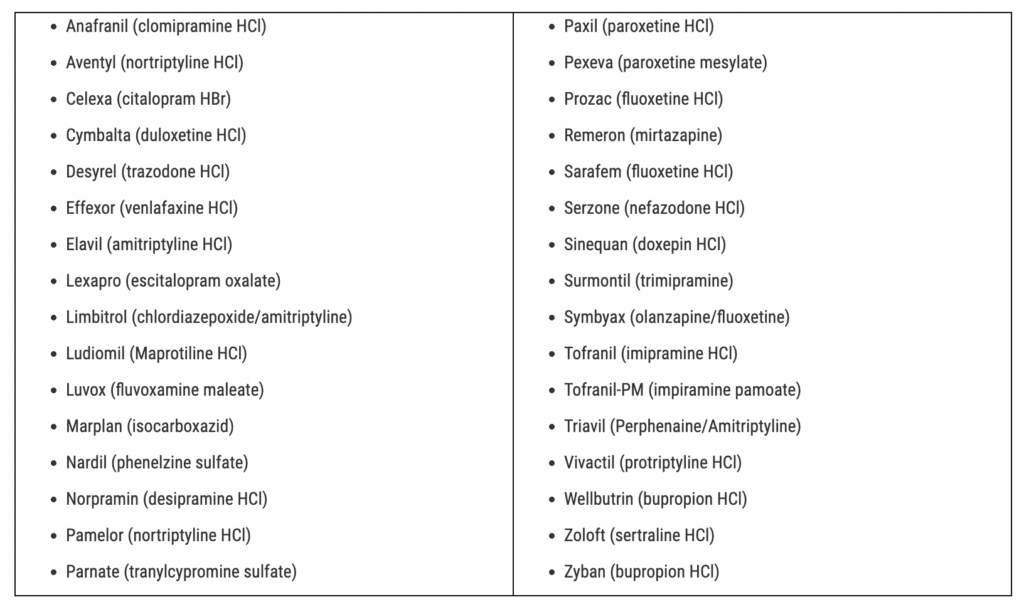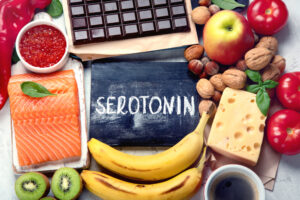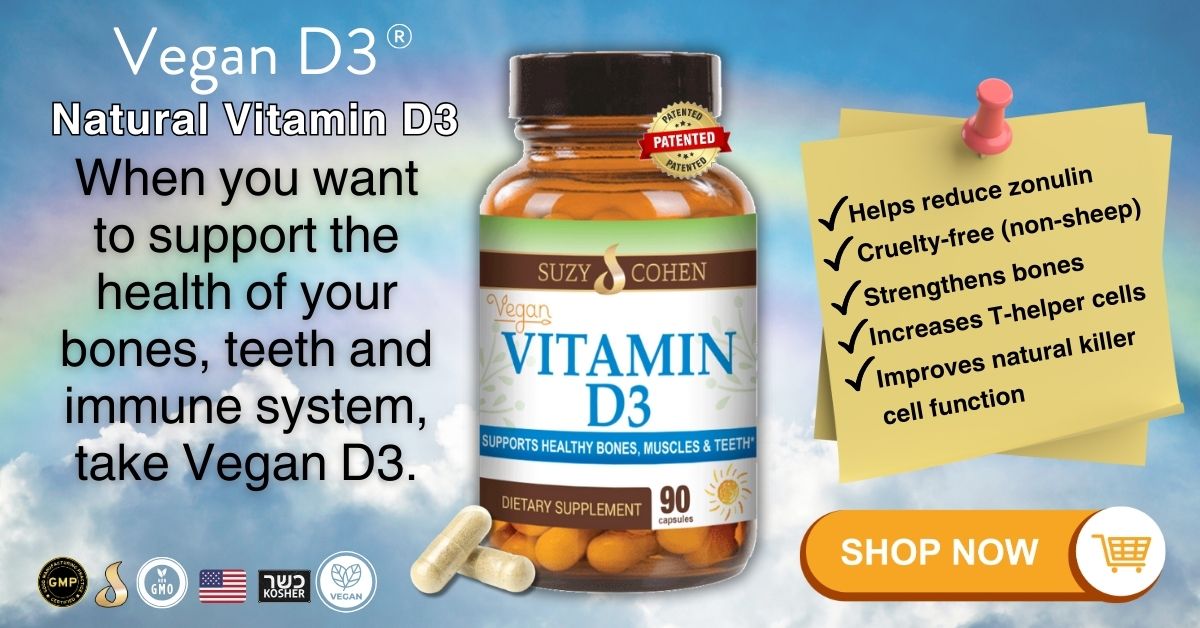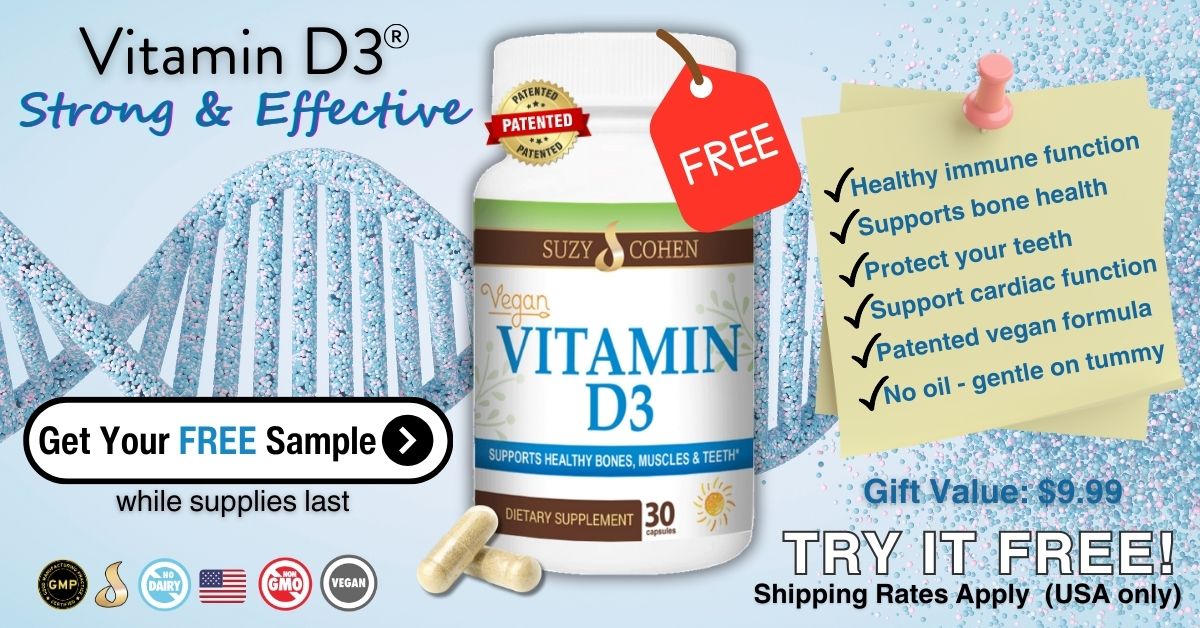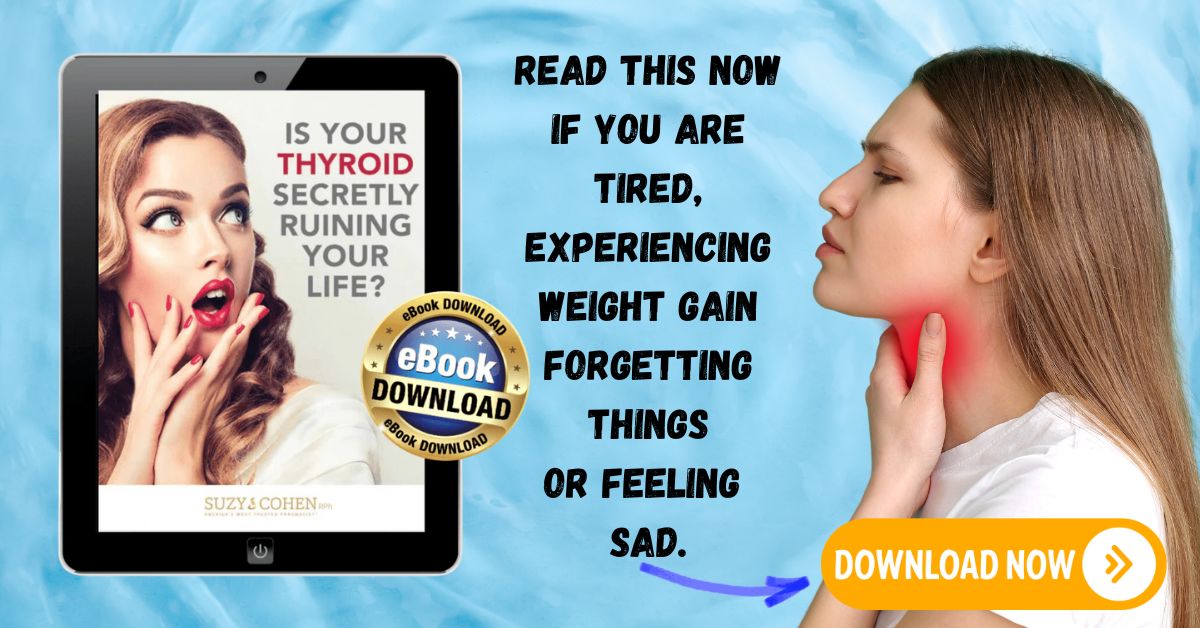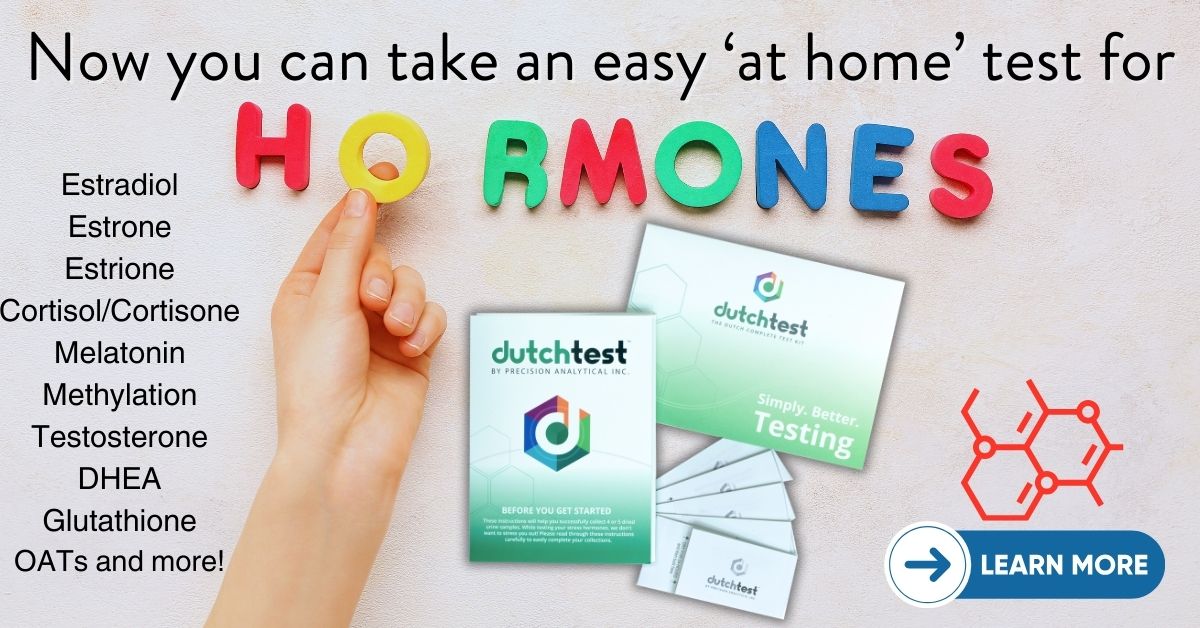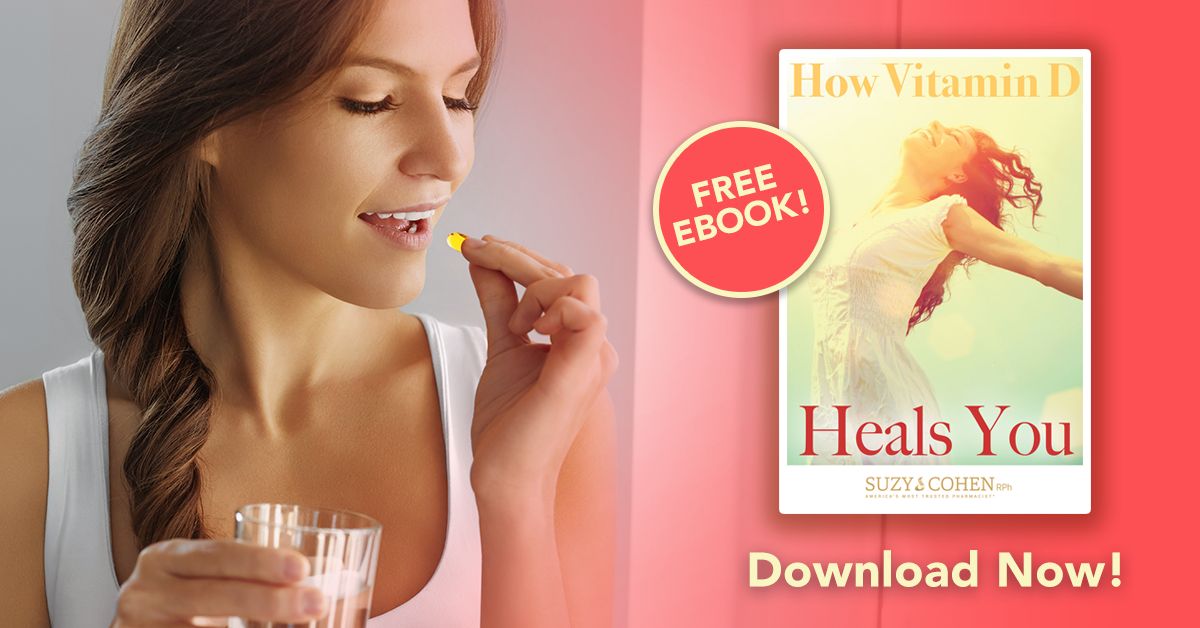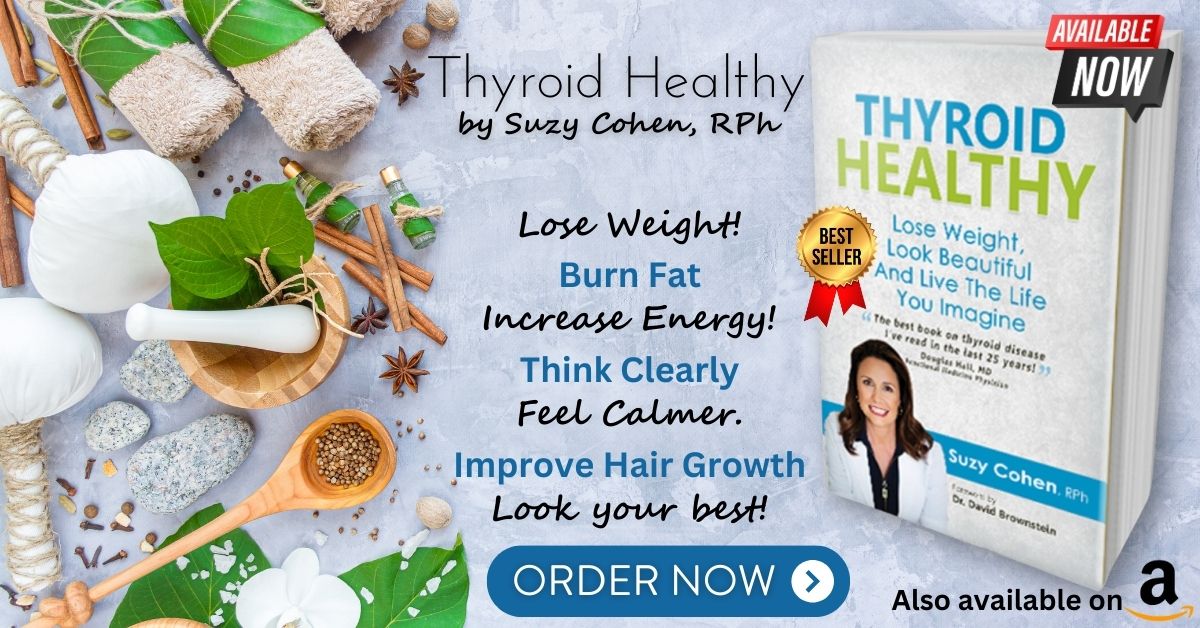What's On This Page?
ToggleThis article offers natural ways to ease depression and reduce anxiety even if it’s related to thyroid hormone dysregulation, migraines, celiac and more. There are natural solutions at the end.
The Ongoing ‘Medication Merry-Go-Round’
I recently ‘awarded’ a ‘Dumb’ Award to “anti-depressant drugs and the doctors who prescribe them for every man and woman who struggles with depression.
Millions of people will get shuffled from one psychiatrist to another, and one drug to another, and you will remain on the ‘medication merry-go-round’ until you feed your brain what it’s hungry for.
Revisiting Last Week’s Comments on Antidepressants
These are my exact comments about anti-depressants and the dumb award:
Dumber Award: We have a tie between anti-depressant drugs and the doctors who prescribe them for every person who is tired or tearful. Of the various ‘happy’ chemicals naturally produced in our body, serotonin is the one most likely to be raised by anti-depressant drugs. But research shows that depression may be caused by elevated stress hormones, low vitamin D levels, diabetes or insulin resistance (diagnosed or not), low progesterone hormone, niacin or folate deficiency or exposure to plastics.
The medication side effects are depressing if you think about it -problems achieving orgasm, low sex drive, insomnia, suicidal thoughts, and heart palpitations. Anti-depressant drugs don’t fix the underlying cause of neurotransmitter deficiencies and doctors should be conducting lab tests to determine the cause for emotional instability before prescribing pills and dismissing you.
The Quest for Better Emotional Health Solutions
I stand by these comments though I realize that my article left many curious about what they COULD or SHOULD be doing to improve mental health and ability to cope with stress.
Anti-depressants such as Zoloft, Prozac, Cymbalta, Celexa, Lexapro, Paxil, Wellbutrin, Effexor and others DO help some people, so I am not going to criticize these effective drugs. However, common sense will tell you that (as a category), these types of medications are incapable of correcting underlying nutritional deficiencies, hormonal imbalances, or neurotransmitter imbalances.
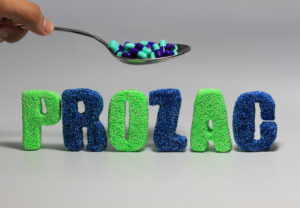
Medications artificially – and temporarily – increase the activity of brain neurotransmitters, but in exchange produce uncomfortable side effects.
The most commonly reported side effects associated with prescribed drug therapy are nausea, insomnia, constipation or diarrhea, low appetite, headache, weakness, restlessness, trembling, shaking, abnormal dreams, and changes in taste perception.
Speaking of taste, consider reading my other article, Sensory Surprises: Dysgeusia And Its Association With A Dozen Medications.
Sexual dysfunction is another real issue associated with almost all prescribed antidepressants, although some drugs are less disruptive than others. Problems such as decreased sex drive, inability to climax are just two common issues that force people to go off their medications.
The FDA’s Response to SSRIs Concerns
In 2018, the FDA posted this: Suicidality in Children and Adolescents Being Treated With Antidepressant Medications.
This simply explains that the FDA has mandated that all antidepressant medications include a “black box warning” – the strongest warning the FDA ever issues regarding life-threatening potentials. The “boxed warning” as it is now referred to indicates an increased risk of suicidality (suicidal thinking and behavior) in children and adolescents treated with these drugs. This action was taken following a 4 months review which revealed a higher incidence in suicidality in pediatric patients treated with antidepressants compared to those receiving a placebo. The analysis included over 4400 participants across 24 trials, showing that the risk of suicidality was about 4% among those on antidepressants, versus 2% for those on placebo.
If you are a parent with a child taking one of these drugs (see below), or a doctor caring for a young child on these drugs close observation for clinical worsening or unusual behavior changes is highly recommended when initiating therapy, particularly during the early treatment phase or when changing doses. Now, I’d like to post a screenshot of the drugs that are listed in the FDA’s warning in case you want to check your medications at home to see if you or your teen takes one.
Medications with a BOXED WARNING from FDA WEBSITE
The above is the list of medications associated with a “boxed warning.” Down below if you scroll you will see another graphic I’ve posted here illustrating some signs and symptoms of depression, but the picture is not complete (ie there are other symptoms not listed on my graphic). Before I get to the natural remedies and options, let’s talk about placebos!
Placebo Effect and Antidepressants: An Eye-Opening Study
The insights into antidepressants are quite the revelation! It appears that their reputed ability to correct a serotonin imbalance – a cornerstone of why they’re prescribed – might not be as scientifically sound as we thought. Intriguing research, including both public (and previously undisclosed studies), suggests that what people experience might largely be the power of belief – the placebo effect.
The crux of this is pretty fascinating: Whether antidepressants raise, lower, or do nothing to serotonin levels at all… they seem to offer similar benefits, which implies that the promoted and trusted “serotonin theory” might need a rethink. Moreover, the small differences observed between the effects of antidepressants and placebos in clinical trials might not just be about the chemicals but could also be influenced by the expectations of doctors and patients. If you want to confirm what they said, dive into the article entitled, “Antidepressants and the Placebo Effect” published in Z Psychology.
The same results was determined through a review published in Front Psychiatry in 2019 in an article entitled, Placebo Effect in the Treatment of Depression and Anxiety, which you can read RIGHT HERE.
So, what’s really at play here might be a blend of minimal actual drug impact and a significant dash of psychological influence. This revelation calls for a fresh approach to how we view and treat depression, urging a pivot towards understanding and utilizing the placebo effect creatively and ethically in treatment. It’s a call to blend compassion with science in our journey towards effective healing strategies, natural and/or conventional.
Some Signs and Symptoms of Depression
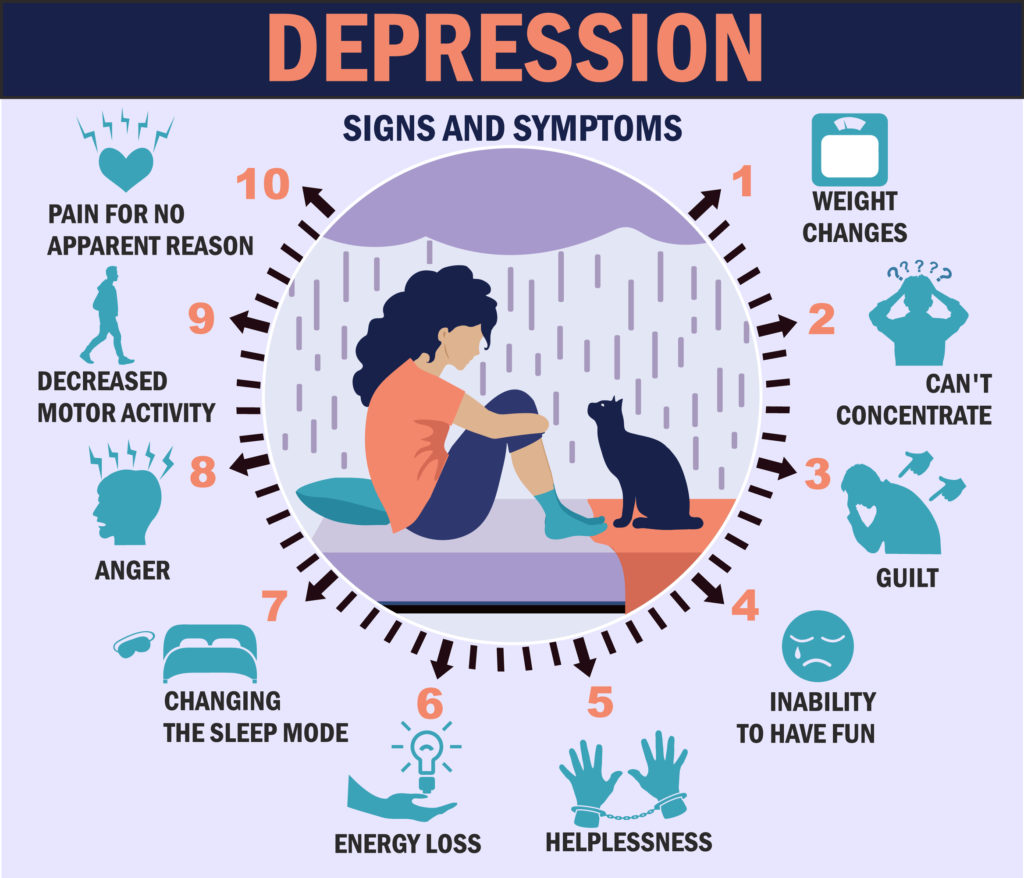
Alternatives to Medication: A Path to Wellbeing
The intention of this article is not to frighten you or shock you, it is to help raise awareness for dietary supplements and vitamins and herbal extracts which can support mood, and possibly allow lower dosages of the drugs being taken. A lower dose means milder and/or fewer side effects.
⚠️ Everything you read here is intended as educational, and whatever you want to do or take needs to be fully discussed with your doctor. One more thing, as you are reading this, you may be tempted to just stop your anti-depressant medication but DON’T. Never suddenly stop prescribed medications based on anything I say, especially with anti-depressants because you could suffer dangerous withdrawal side effects. Ask your doctor to help you wean off if you are determined to get off prescribed drugs, don’t just suddenly stop them.
Serotonin: The ‘Happy’ Chemical That Resides in Your Gut
Serotonin is famous as the neurotransmitter/hormone that is most often ‘lifted’ by pharmacological drugs known as Selective Serotonin Reuptake Inhibitors (SSRIs). It is synthesized from tryptophan via chemical reactions.
Serotonin is thought of as a brain hormone, but surprise… 80% of this so-called “happy” brain chemical lives in your gut, and when you eat food, gut cells known as the enterochromaffin cells release the serotonin so your digestive tract contracts. Serotonin happens to help us regulate GI function, but it also improves mood, learning, memory, cognitive function, self-esteem, and feelings of joy. Lifting serotonin could relieve pain too. You may be interested in my article entitled, Serotonin: How the Gut-Brain Axis Boosts Mood.
Numerous prescribed antidepressants work along this pathway. Serotonin is a “monoamine” (MAO) neurotransmitter that is also targeted by many anti-psychotic, anxiolytic, and anti-migraine medications. You are supposed to be able to make serotonin naturally in your body, but you can’t if you become deficient in certain nutrients, vitamins, or amino acids. Our serotonin levels are affected by diet, no surprise here. An increase in the ratio of ‘tryptophan to phenylalanine and leucine’ will increase serotonin levels.
Fruits with a good ratio include dates, papaya, and banana. And this is interesting. Foods with a lower ratio of these amino acids inhibit the production of serotonin and therefore leave you at greater risk for depression. These foods include whole wheat and rye bread. One more reason to eat gluten-free (but haven’t I asked you to do this a hundred times over the years?)
Speaking of fruits, it’s a good time to tell you that fruit-drug interactions exist, and they can be dangerous. Want to understand which fruits, and which medicines to NOT mix? Read my other article, 5 Fruit Interactions With Medications: What You Need To Know To Stay Safe.
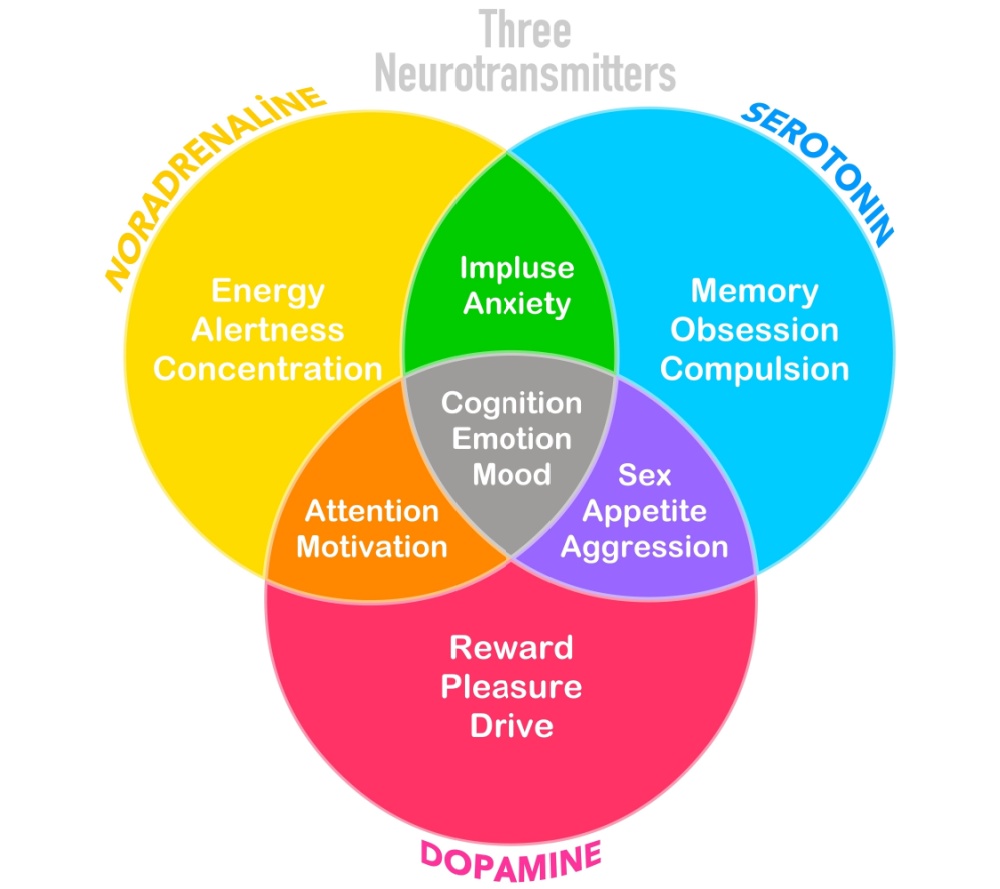
Norepinephrine: The ‘Fight or Flight’ Chemical
Norepinephrine (aka noradrenaline or just “norepi”) is primarily responsible for communication between your nerve cells, and also for your ability to experience the famous “fight or flight” response. Norepinephrine is sometimes shortened to norepi (pronounced “nor- epee”) and it is synthesized from dopamine, another neurotransmitter that affects mood. Norepinephrine is associated with arousal levels, and so too much of a good thing can cause worry, anxiety, phobias, restlessness, fears of crowds, insomnia, and so forth.
Too much norepi can also increase heart rate and blood pressure -this can be dangerous. Finally, too much norepi has been tied to panic attacks and it’s easy to see why. The balance between all your brain hormones is crucial to emotional wellness. With depression, you have to think imbalance of norepi to other brain hormones, or perhaps too little norepi production.
When you fail to produce enough norepinephrine, you may find it harder to focus and pay attention (think attention-deficit… and in fact, many ADHD drugs lift this chemical). Low levels of norepi are also associated with poor memory, depression and low levels of arousal.
GABA: The Calming Neurotransmitter
A brain neurotransmitter that helps us relax. This substance has to be in balance with glutamate or mood suffers. GABA is involved in sleep too. GABA is a quieting hormone, and for this reason, it is useful in helping to prevent seizures (an excitatory state). Deficiencies of GABA could lead to trouble coping, feeling anxious, stressed out or depressed. You can buy dietary supplements of GABA at any health food store nationwide and many people take this with good effect.
The big debate is whether GABA supplements really work because the molecule is very bulky and can’t penetrate the blood-brain barrier. This reminds me of shopping last week, I watched a lady who was clearly a size 8 shoe struggling and practically breaking a sweat to squeeze her foot into a size 6 and 1/2. Ain’t gonna happen! It’s the same with GABA, it can’t get through the blood-brain barrier very well. Soon enough, I will tell you which two inexpensive nutrients get into the cells, and allow you to produce the GABA yourself.
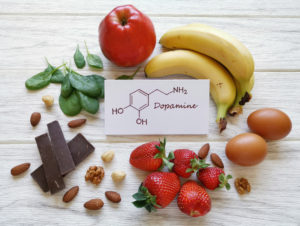
Dopamine: The Pleasure and Reward Hormone
Dopamine is your pleasure hormone, it is associated with feelings of happiness, even more so than serotonin in my opinion. Dopamine is the chemical most associated with rewards and enjoyment, it gives us that ‘high’ so to speak, which then causes us to want to keep doing a particular activity.
Think compulsive gambling, sex and so forth. Cocaine happens to stimulate levels of dopamine too. As it pertains to depression, it is the imbalance of this hormone to the others, or a decreased ability to utilize it or produce it. So low levels of dopamine are associated with depression and when you give the body precursors (such as tyrosine or levodopa) the effects work very fast, much faster than prescribed anti-depressants which usually take 4 to 8 weeks to exhibit optimal effects.
Dopamine is the substance that is associated with Parkinson’s disease (low levels) and schizophrenia (higher than normal levels). Drugs that are ‘dopaminergic’ meaning they behave like dopamine act outside the brain, not inside. In other words, if you want to increase brain levels of dopamine, you can’t give it as a drug, you have to give precursor nutrients and amino acids so they can slip inside the ‘blood-brain barrier’ get into the brain and then the brain can ‘bake the dopamine’ out of the recipe ingredients that you provide. Got it?
Potential Solutions for Improved Mood
With your physician’s approval, you can try one or two of the dietary supplements below, or you can buy a combination formula for enhanced effects. A combination of ‘multi-tasking’ formula may be more cost-effective too, and there are several high-quality brands to think about. .
For some people, even one or two of the substances below can have a positive impact on mood. The reason is that some of the compounds below (such as Vitamin C or 5-MTHF) are needed to drive a chemical reaction in the body that forms our mood-boosting hormones.
Without these simple, inexpensive nutrients, the chemical reaction comes to a screeching halt so the mood-boosting hormones don’t form. See, it’s very simple chemistry but unfortunately, the vast majority of physicians are educated at conventions that are pharma-funded so it’s all about the next best drug, rather than simple biochemical reactions. I’ll give you some new perspectives and natural choices.

Supplements that Support Mood and Cognition
Vitamin C
You need vitamin C to run the metabolic pathway which synthesizes dopamine, norepinephrine, serotonin and others. Without C, you could become deficient in crucial neurotransmitters.
However, supplementing with vitamin C is just one of other nutrients required as cofactors. Also, an herb called “Camu Camu” is a fantastic way to get natural vitamin C. It is a dietary supplement that is extracted from the Camu Camu berry and it is probably THE richest source of vitamin C, botanically-speaking. You can find vitamin C at any health food store and pharmacy including my own vitamin SHOP.
Vitamin B1
B1 (thiamine) has an important effect on the release of serotonin and norepi. The body uses this vitamin to help convert glucose, into fuel and if there isn’t enough, you can develop fatigue, depression, irritability, anxiety, and even thoughts of suicide. Deficiencies can also cause memory problems, low appetite, nervousness, psychosis, insomnia, and gastrointestinal disorders.
People who drink alcohol (even one glass a night) are usually deficient in this B vitamin. (There is a lot more information about vitamins like thiamine (and symptoms of deficiency in my Drug Muggers book. A typical thiamine dosage is 100mg daily, but sometimes it is best to take B1, along with other B vitamins so you have all the Bs on board. Consider Mito B Complex – it’s available at my shop and it contains “benfotiamine” a lipophilic highly bioavailable form of thiamine. It also has 5-MTHF which we will discuss next.
5-MTHF
It’s another essential B vitamin, and B vitamins are crucial in easing and preventing depression. Since B vitamins are water-soluble, they can’t be stored in the body and must be obtained through food or supplements. This specific B vitamin is the biologically active form of folic acid known as 5-MTHF, which is definitely worth seeking out. It plays a key role in producing neurotransmitters.
Why not just take folic acid? Because many people have a genetic variation (a methylation SNP) that impedes the conversion of folic acid into 5-MTHF, leading to potential deficiencies. When you’re deficient, your body struggles to produce neurotransmitters correctly, which can lead to depression or even a misdiagnosed serious mental health disorder. Recognizing the importance of this, a prescription version called Deplin is available at pharmacies, highlighting how critical methylfolate is to mood management.
For those who appreciate a bit more science, 5-MTHF aids in ‘methylation’—a vital process that helps you detoxify. Essentially, it helps convert the potentially harmful chemical homocysteine into the useful substance methionine. Taking it further, your body then transforms methionine into S-adenosylmethionine, or SAMe (pronounced “sam-ee”).
Interestingly, SAMe is well-regarded for relieving depression and has been extensively studied. If your body lacks 5-MTHF, it can’t naturally produce SAMe. While SAMe is readily available at health food stores and pharmacies, some practitioners believe that its effects may be short-lived and that it is highly unstable once packaged.
To learn more about methylation, read my article here.
Niacin
If you run out of this B vitamin (vitamin B3) it could produce serious mental health problems including psychosis and dementia. Niacin (B3) is involved with the dopamine transmitter pathway. Deficiencies of vitamin B3 can produce agitation and anxiety, as well as mental sluggishness, schizophrenia, and depression.
Holistic practitioners often recommend vitamin B3 (niacin) as part of a treatment plan for psychiatric problems, including schizophrenia. One more thing, niacin deficiency can also cause high cholesterol so if you are depressed and have high cholesterol, you may have an undetected (subclinical) niacin deficiency. Taking niacin (if you get the real kind, or high enough dose), will cause warming of the body called a “flush.” It’s harmless, and passes after about 30 minutes. It helps reduce cholesterol.
Magnesium
Some people think that replenishing magnesium could be the cure for depression without doing anything else. I agree that magnesium is powerful when it comes to mood enhancement, but I’m not convinced that it’s all you need. Magnesium has a role in minimizing migraine headaches too,
Without enough magnesium to keep an eye on serotonin, serotonin starts to overact and constrict blood vessels which causes the release of pain chemicals (substance P and prostaglandins), contributing to migraines! Compare that situation to normal magnesium levels that help that prevent this cytokine release, blunting pain a little.
Clearly, magnesium plays an important role in the brain and all over the body. It also helps the body manufacture brain neurotransmitters. The biggest issue I have with magnesium is the cheap “oxide” forms, or the “citrate” type which is alright but more of a laxative! And the other issue is how doctors measure it. They mistakenly take serum magnesium levels, but this needs to be measured intracellularly.
You can find magnesium supplements at health food stores nationwide. If you want to take this orally, I prefer you get the chelated version, it will say “magnesium chelate” or “amino acid chelate” on the label. I also sell this supplement in an easy-on-the-tummy form of magnesium, click here. Find out if you Are You Taking the Right Kind of Magnesium? Pros and Cons of 5 Popular Types
Tyrosine and Iodine = Thyroid Hormone
These substances help you make thyroid hormone and low thyroid is a commonly overlooked cause for depression. Tyrosine also happens to be a precursor to the brain chemical, dopamine which is your ‘happiness’ hormone. Tyrosine is sold widely at health food stores, and so is iodine. Thyroid hormone medications may work better than typical prescribed antidepressants. CLICK HERE to learn about that.
Eleuthero extract
This is also called “Siberian Ginseng” adaptogenic herb which helps the body cope with stress while improving concentration and feelings of well-being. It’s an herb that has been used in Chinese medicine for over 2,000 years. You won’t get an overnight effect with this one, you have to take it for several months, and you have to make sure you have a high-quality source (many brands are adulterated). This botanical can help reduce fatigue and increase stamina. Eleuthero is thought to relieve depression by nourishing the adrenal glands.
This is incredibly important and many traditional doctors don’t pay much attention to worn out adrenal glands. Women who are tired stressed and juggling a job, kids, debt, caregiving, etc. tend to burn out their adrenal glands and just need nourishment for them, in order to feel well again. Drugs won’t help. Eleuthero to the rescue.
It is beneficial when the HPA (hypothalamic-pituitary-adrenal axis) is depleted, and the symptoms of which include fatigue, stress, weakness, memory loss, and sore muscles associated with the low functioning of the endocrine system. Eleuthero can help balance dopamine, norepi, epinephrine, and serotonin.
Progesterone
Progesterone is made in the body, it’s not the same as the drug Provera. Natural progesterone has a calming effect and balances estrogen which has more of a stimulating effect. A healthy woman will have the proper ratios of these each day of the month, and the ratios fluctuate depending on the time of the month, and the age of the woman. The DUTCH Compelte test can evaluate certain sex hormones and their metabolites, and much more. It’s available as an at-home test now.
Progesterone is produced in women along with estrogen during the reproductive years and is often referred to as the ‘great balancer’ due to its important role in keeping estrogen and overall hormone levels in balance with one another. Around the age of 40, your hormone balance changes in preparation for menopause which usually occurs around the age of 50.
During these 10 years, estrogen levels fluctuate erratically and eventually decline to half of your youthful levels, but progesterone which is needed to keep estrogen in balance can plummet to nearly zero. The condition of progesterone deficiency is sometimes referred to as “estrogen dominance.” You can tell if you have this problem by symptoms most of the time. Women are deficient in progesterone (estrogen dominance) may develop anxiety, depression, irritability, hot flashes, night sweats, weight gain, insomnia, osteoporosis and low sex drive.
Pre-menopausal women may have PMS, breast tenderness, migraines, mood swings, bloating, and heavy periods. Doctors may want to conduct hormone testing to detect the imbalance and this may include urine, blood or saliva analysis. My fear is that they will fail to tell you that natural progesterone is available over-the-counter, and instead, prescribe a medication that only mimics the effects, and causes dangerous side effects.
Natural progesterone is sold at health food stores, like a cream that you can apply to your skin. And it’s also available to doctors (and you) through compounding pharmacies, but bear in mind that bio-identical progesterone is not the same as synthetic medications like medroxyprogesterone, Provera or PremPro. Those are not bio-identical so if your doctor tells you that you need this hormone, buy it OTC and apply it to your skin on the neck, chest, inner arms, breasts or thighs. Dosages are on the bottle.
Natural cream versions (sold OTC) may lift depression if it’s related to estrogen dominance (progesterone deficiency). If you apply progesterone and find that your hot flashes worsen, that usually means that you need to work on fixing your overworked adrenal glands for a few months, and calm the estrogen down, before trying the progesterone again. I really like Emerita’s brand “Pro-Gest” because it is paraben-free and contains vitamin E, sweet almond oil and other natural ingredients. You can buy it at most health food stores and online.
Vitamin D
People with depression or SAD (seasonal affective disorder) are usually deficient in vitamin D. I could write a book on this one. There are many, many studies to prove that D deficiency is associated with depression and the vitamin/hormone is sold OTC. It has a profound effect on balancing the brain neurotransmitters mentioned above. There is a little debate over what the healthy range is but you can have it measured. If it’s less than 50 ng/ml, I would start treatment.
Most traditional doctors would not agree with me and would say that if it’s less than 35 ng/ml, begin treatment. The best form of vitamin D to take is D3 or cholecalciferol. It will say this on the label. A typical dosage that could help you if you have depression would be 2,000 to 10,000 IU per day, taken in the morning.
Another good source for vitamin D is cod liver oil. There are good-tasting versions available at most health food stores, plus there are softgels so you don’t have to take a liquid if you don’t want to anymore.
Essential Fatty Acids for Depression
These are good fats. A common sign of deficiency of essential fatty acids (EFAs) is depression. The EFAs offered by fish oils, krill oil, flaxseed, hempseed, and cod liver oil all offer something special to help improve communication of the nerve cells and help nourish the cell membrane which is extremely important in brain function and emotional wellness. If the cell membrane isn’t healthy, it can’t get rid of waste, and it can’t properly send nerve signals.
Some studies suggest that EFA therapy may be better than drug therapy! If you want to take fish oils or cod liver oil, try about 1,000 mg once or twice daily with food. To bring in flaxseed, go to your health food store and buy some ground flaxseed (or buy the seeds and grind them yourself in a coffee bean grinder).
Sprinkle ground flax – about a teaspoon or two every day. Additionally, you can buy hulled hemp seeds. These are also sold at health food stores, and they taste great.
5-HTP
Tryptophan is an essential amino acid. Your body can’t make it. When you get tryptophan from foods and supplements, your body converts it to 5-hydroxytryptophan, or 5-HTP. You can also buy supplements that contain 5-HTP, either as a stand-alone product of 5-HTP, or a combination formula that contains a little bit of it. Why does this matter so much? Because 5-HTP goes through the blood-brain barrier and gets into the brain. It gets converted to serotonin there.
If you recall, serotonin is one of your brain neurotransmitters. If you want to make this conversion process easier, take 5-HTP with some vitamin B6 which pushes the reaction along faster.
The Cost-Effective Approach with Combination Formulas
Formula: Emotional Balance Support (Formerly Deproloft-HF)
This is a combination formula manufactured by Thorne Research which I custom-formulated for them years ago. It’s one of their top sellers and they’ve renamed it. The ingredients of Emotional Balance Support include many that I’ve mentioned above, as well as St. John’s wort and Rhodiola, two fantastic botanicals when it comes to mood enhancement. What I like in particular about this formula is that it is supportive to a healthy mood even if you happen to have:
- Low thyroid hormone
- B vitamin deficiency
- Adrenal fatigue (because it has adaptogenic herbs like eleuthero, rhodiola)
- Low levels of dopamine, norepi, serotonin or GABA (it offers the precursors to these hormones so you can make it intracellularly).
Important savings worth mentioning- It’s more cost-effective than trying to buy each ingredient by itself. The dosage is 1 or 2 capsules once or twice daily. Read the label to be sure. If you take Emotional Balance Support (Formerly Deproloft-HF), you may not need anything else but in case you do, add in Omega 3 fatty acids (fish oil) for even more mood enhancement. You could also bring in vitamin D, however, this supplement (all by itself) an effective supplement for emotional balance.*
A Summary of Natural Aids for Emotional Wellness
Remember, if you are feeling blue, there is always something you can try. ❤️ Please don’t give up, it won’t rain forever. Know that you are loved and needed, and for every door that closes, another opens. The wheels of life keep turning.
Please no matter how desperate you feel, know that there are options. I’ve done the best I can to list the most effective, well-researched items, and there are more that are not even listed here.
If you are feeling overwhelmed because I’ve mentioned so many choices for you, then try one of the multi-tasking combination formulas. If you are not feeling any better after about a month, add in some fish oils.
If that doesn’t help you, get your hormones tested and see if your estrogen/progesterone ratios are off (or DHEA/cortisol), and if those are all normal, ask your doctor to check your thyroid hormone levels. You may have hypothyroidism and may be interested in my book on this topic.
Some integrative medical doctors help their patients get through the withdrawal effects by advising them to begin natural antidepressant herbals or vitamins (which I’ll get to in a minute) while weaning off the prescription medications, but again, tapering prescribed anti-depressants and/or taking natural mood supportive nutrients is between you and your physician(s). I am only providing education for you.

Suzy Cohen, has been a licensed pharmacist for over 30 years and believes the best approach to chronic illness is a combination of natural medicine and conventional. She founded her own dietary supplement company specializing in custom-formulas, some of which have patents. With a special focus on functional medicine, thyroid health and drug nutrient depletion, Suzy is the author of several related books including Thyroid Healthy, Drug Muggers, Diabetes Without Drugs, and a nationally syndicated column.
